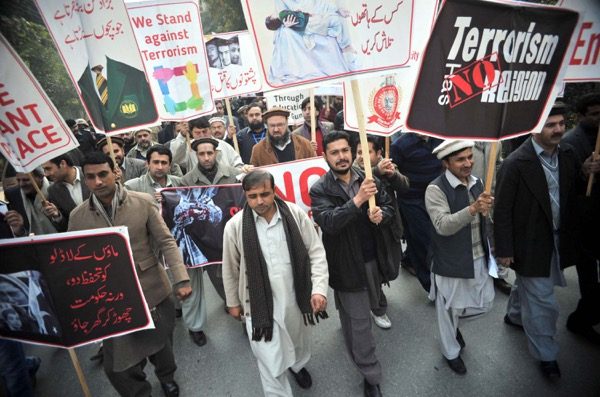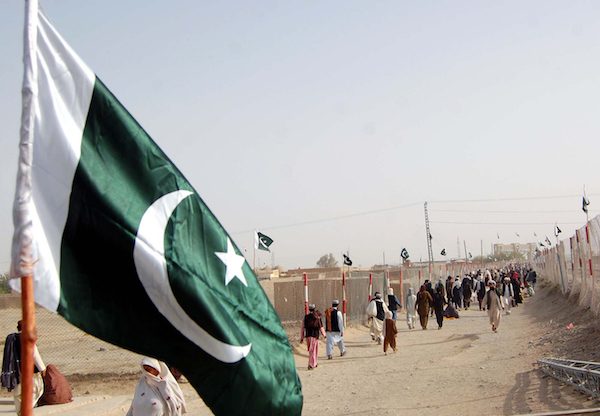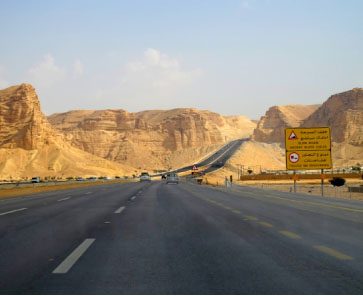Continued serialisation of the English rendering of Hadhrat Mirza Bashir Ahmad(ra)’s outstanding biography, ‘Seerat Khatamun Nabiyyin’, on the life and character of the Holy Prophet Muhammad(saw). ‘Seerat Khatamun Nabiyyin’ has been translated into English for the first time, and is being serialised in The Review of Religions before its full release as a book. This section of the series looks at how the most powerful tribe of Makkah, the Quraish, hatched various plans to try and hinder the progress of the Muslims.
Translated from the Urdu by Ayyaz Mahmood Khan
Chieftains among the Infidels
Among the Quraish, those who fiercely opposed Islam and were considered the leaders of others in this movement, were not entirely of the same disposition. Some possessed personal decency, and in their own way desired to deal with goodness. Others, however, on account of their haughtiness, could not accept obedience to the Holy Prophet(saw) and were also exasperated due to the notion that the religion of their forefathers was being destroyed by various so-called ‘vain idealists’. Among them, the following seem to stand out: Firstly, Mut‘im bin ‘Adiyy who was from the Banu Nawfal and was among the chieftains of the Quraish. Mut‘im was a staunch idolater but observed as much decency as possible in his affairs. As such, we shall see later that, in ending the boycott of the Quraish with the Holy Prophet(saw), and in bringing him into Makkah under his protection, when he returned from Ta’if, Mut‘im dealt with special goodness and courage. Second was Abul-Bakhtari from the Banu Asad. Abul-Bakhtari would also, to the best of his ability, hold fast to decency. In this same context, there was a man named Zubair bin Abi Umaiyyah who was the brother of Umm Salamah and despite his discord, he would always deal in goodness.
The second category of people was of those whose opposition entailed an aspect of mischief. Among these, the following are most prominent: Firstly, ‘Utbah bin Rabi‘ah who was from the Banu ‘Abd Shams and was very affluent and influential. In the Battle of Badr when ‘Utbah came before the Islamic Army astride his red camel, the Holy Prophet(saw) upon seeing him said, “If there is some goodness in this group, indeed, it is in the rider of this camel.” ‘Utbah’s brother Shaibah was also under his influence. Both of them were killed in the Battle of Badr at the hands of Hadhrat Hamzah(ra) and Hadhrat Ali(ra). Secondly, was Walid bin Mughirah, the father of Khalid bin Walid, a great chieftain of the Quraish, to the extent that he was considered a father-figure by the Quraish. Coincidentally, three months after the Holy Prophet(saw)’s migration, he was hit by an arrow and died. Thirdly, was ‘Aas bin Wa’il al-Sahmi, who was the father of ‘Amr bin Al-‘As. He was also very wealthy and influential. He died a very painful death, due to the swelling of his foot, two months after the Holy Prophet(saw)’s migration.

The state of the third category of people was completely different. These people were ones to oppose the Holy Prophet(saw) blindly and would employ all just and unjust means in their effort to obliterate Islam and the founder of Islam from the face of the earth and crushing the Muslims under their feet. Among the Quraish, it was these people who were in greatest force and number. Among them, the most notorious are: Firstly, ‘Amr bin Hisham from the Banu Makhzum. This man is one who should be better referred to as the ‘Chief of the Enemies’. He possessed distinctive power among the Quraish and they referred to him as Abul-Hikam, or ‘The Father of Wisdom’, but the Muslims named him Abu Jahl [i.e. the father of ignorance]. He was cast to Hell by two youngsters of the Ansar in the Battle of Badr.
Secondly, was Abu Lahab bin ‘Abdul-Muttalib who was from the Banu Hashim and was the biological, paternal uncle of the Holy Prophet(saw). He was as antagonistic and injurious as Abu Jahl and he is also unique, in that among the enemies of Islam, only his name has been mentioned in the Holy Qur’an so unambiguously. Abu Lahab perished some time after the Battle of Badr in Makkah.
Thirdly, was ‘Uqbah bin Abi Mu‘it from the Banu Umaiyyah, who was a wicked and malicious individual. He took part in the Battle of Badr and was killed. Then there was Umaiyyah bin Khalf who was from the Banu Jumah. He was akin to Abu Jahl in mischief and enmity. He was killed in the Battle of Badr. Umaiyyah’s brother, Ubaiyy bin Khalf was also a man of similar disposition. He was wounded by the Holy Prophet(saw) and met his fate during the Battle of Uhud. Then there was Al-Nadr bin Al-Harith from the Banu ‘Abd al-Dar who inflicted grievous pains upon the Holy Prophet(saw). He was made captive during the Battle of Badr and was killed in retribution of his crimes. Then, there was Aswad bin ‘Abdu Yaghuth, Harith bin Qais, Aswad bin Muttalib, Abu Qais bin Fakhad, Munabbah bin Al-Hajj, Nabiyyah bin Al-Hajjaj, Malik bin Tulatalah, Hakam bin Abil-‘As, Rukanah bin Yazid, etc., who, more or less, were a part of this villainy and enmity.1

In addition to these, there were many others who were also fierce in their enmity, but since they later became Muslim, to mention them in the above list is perhaps incorrect. More appropriately, they shall be mentioned ahead.
Enmity of the Quraish against Islam and its Founder
When the opposition of the Quraish began against Islam, it increased day by day and began to take on a perilous turn. Sir William Muir writes that the Quraish had decided:
“The new doctrine must be crushed, and its followers forced to abandon it. By degrees the persecution grew hot.” 2
In actuality, the affliction pitched against Islam by its opponents and the tactics employed to annihilate it is a long and grievous story, which extends to the eighth year of migration.
First Delegation of the Quraish to Abu Talib
The very first attempt made by the Quraish was to deprive the Holy Prophet(saw) of the sympathy and protection of Abu Talib, for they knew that as long as Abu Talib sided with the Holy Prophet(saw) action could not be taken against him without disturbing inter-tribal relationships. Abu Talib was the chieftain of the Banu Hashim, and despite being an idolater, was the guardian and protector of the Holy Prophet(saw). As such, in light of inter-tribal politics, to raise a hand against the Holy Prophet(saw) in his presence was equivalent to declaring war against the Banu Hashim for which the rest of the Quraish was not yet willing. Therefore, their initial scheme was that they sent a friendly delegation to Abu Talib to convince him to stop his nephew from the propagation of Islam. As such, Walid bin Mughirah, ‘Aas bin Wa’il, ‘Utbah bin Rabi‘ah, Abu Jahl bin Hisham and Abu Sufyan, etc., who were all among the chieftains of the Quraish, approached Abu Talib and said kindly:
“You are revered amongst our people. For this reason we request you to prohibit your nephew from the propagation of this new religion, or relinquish your protection of him and leave us and leave him that we may judge between ourselves.”
Abu Talib spoke to them in great tenderness, and continued in an attempt to cool their rage, and ultimately sent them back calm.3
Second Delegation
However, since the cause of their displeasure remained, rather, continued to increase day by day, and austere verses prohibiting polytheism were being revealed, it was not long before these people once again gathered before Abu Talib and said:
“Now the matter has reached its limit and we are referred to as impure, foul, the worst of creation, foolish, and the children of Satan. Our gods are referred to as the fuel of hell and our ancestors are described as those who think not. Therefore, we can bear no more, and if you cannot renounce your protection of him, then we are also compelled, for we shall fight you, until one party of the two is destroyed.”
The matter had now become very sensitive for Abu Talib. He became very frightened and called upon the Holy Prophet(saw) at once. Upon the arrival of the Holy Prophet(saw), he said to him:
“O my nephew! Your words have now truly enflamed the people and it is nigh that they destroy you and me as well. You have declared their wise men foolish; their ancestors have been described as Sharrul-Bariyyah [i.e. the worst of creatures]. Their venerable gods have been named the firewood of hell and Wuqudun-Nar [i.e. the fuel of hell], and they themselves have been described as impure and foul. I tell you in good faith that you should restrain your tongue from such offensive language and forsake this undertaking, for I have not the power to fight all the people.”
The Holy Prophet(saw) understood that now the steadfastness of Abu Talib had also been tested, and amongst worldly sources, the greatest support of the Holy Prophet(saw) was about to crumble under the weight of opposition. But the Holy Prophet(saw) did not exhibit the slightest discontent. With great composure he said:
“This is not abusive language, rather it is the truth asserted upon its correct place, and it is for this purpose that I have been commissioned, that I may show them their evils and invite them towards the right path. If I must die in this cause, I delightedly accept my fate. My life is devoted in this cause, and I shall not abstain from the expression of the truth by fear of death. O Uncle! If you are worried on account of your weakness and distress, then by all means relinquish your protection of me. I shall never refrain from the conveyance of divine injunctions. By God! If these people put the sun on my one hand and the moon upon the other, even then I shall not refrain from the fulfilment of my responsibility. I shall continue my work until God completes it or I die in this endeavour.”
The Holy Prophet(saw) was delivering this address whilst his countenance conspicuously exhibited the zeal of truth and serenity. When the Holy Prophet(saw) completed his address, he set off immediately and desired to leave, but Abu Talib called upon him from behind. When the Holy Prophet(saw) turned back, he noticed that Abu Talib’s eyes were filled with tears. Abu Talib addressed the Holy Prophet(saw) weeping, and said, “My nephew, go then and engage in your work. Until I live, I shall stand by you with my full power.”4
Third Delegation
This time when the Quraish failed, they hatched another plan. They went to Abu Talib along with a promising young man belonging to a noble family of the Quraish named ‘Ammarah bin Walid. They said:
“We have brought ‘Ammarah bin Walid along with us, for you are aware that he is but one of the best young men of the Quraish. Take this young man in exchange of Muhammad, and benefit from him as you wish. If you see fit take him as your son. We fully relinquish his rights, and in his place hand over Muhammad to us, who has betrayed our ancestral religion and raised a tumult in the people. In this way the law of a life for a life shall be fulfilled and you shall have no complaints.”
Abu Talib responded:
“This is strange justice. You wish for me to take your son and make him my own. I should feed him and give him drink, and give you my own that you may slay him? By God, this shall never happen.”
On behalf of the Quraish, Mut‘im bin ‘Adiyy said:
“Then O Abu Talib, your people have tried to reason with you in every manner and has restrained itself from fighting but you do not seem to agree to any of their terms.”
Abu Talib said:
“By Allah, I am not being dealt with in justice, and O Mut‘im, in the espousal of your people, I see that you are prepared to act perfidiously towards me. If it is you who has changed his conduct towards me, then what can I say? You may do as you wish.”5
Verdict of the Quraish Regarding the Muslims
When the chieftains of the Quraish were disappointed by Abu Talib, prior to laying hands on the Holy Prophet(saw) they proposed that every tribe pressurise the Muslims of their respective tribes so as to turn them away from their allegiance to Islam. Therefore, by mutual consultation they all decided that new Muslims be pressured by their respective tribes so as to prevent any sort of inter-tribal complications. They thought that when Muslims themselves forsake the Holy Prophet(saw), he would not be able to do anything alone, and this entire jest would fall apart. In this proposal it was also decided that this coercion be not limited to verbal pressure alone, but that new Muslims be turned away from Islam by all means of agitation and distress. When Abu Talib was informed of these deliberations, he gathered the Banu Hashim and Banu Muttalib at one place as a responsive measure and discussed the situation at hand. He urged them that in this storm of enmity they should protect Muhammad(saw). Consequently, with the exception of Abu Lahab (who was blind in his animosity towards Islam) the rest agreed to this proposition. In national honour, they became prepared to contend opposition in favour of the Holy Prophet(saw).6 These circumstances gave birth to a fiery tension in the air of Makkah. Until now, since the decision to inflict pain upon the Muslims was confined to the limits of their respective tribes, for this reason, inter-tribal conflict had not erupted. However, for the Muslims, individually, the door to severe pain and suffering was opened. The tale of this period extending to the migration of Yathrib is a tale which brings about tears of blood.
ENDNOTES
1. * Al-Kamilu fit-Tarikh, by Imam ‘Izz-ud-Din ibnil-Athir, Vol.1, pp. 667-673, Babu Dhikril-Mustahzi’ina wa man kana Ashaddul-Adha lin-Nabisa, Darul-Kutubil-‘Arabi, Beirut, First Edition (1998)
* Sharhul-‘Allamatiz-Zarqani ‘alal-Mawahibil-Ladunniyyah, By Muhammad bin ‘Abdul-Baqi Az-Zarqani, Vol.1, pp. 462-473, Babu Dhikri Awwalu man Amana billahi wa Rasulihi, Vol.1, pp. 462-473, Darul-Kutubil-‘Ilmiyyah, Beirut, Lebanon, First Edition (1996)
2. Life of ‘Mahomet’, by Sir William Muir, p.62, reprint of the 1894 Ed., published by Voice of India, New Delhi
3. As-Siratun-Nabawiyyah, by Abu Muhammad ‘Abdul-Malik bin Hisham, p.200, Babu Mubadati Rasulillahi(saw) Qaumahu wa ma kana minhu, Darul-Kutubil-‘Ilmiyyah, Beirut, Lebanon, First Edition (2001)
4. * Izalah-e-Auham, by Hadhrat Mirza Ghulam Ahmad(as) (the Promised Messiah & Mahdi), Ruhani Khaza’in, Vol.3, pp.110-111
* As-Siratun-Nabawiyyah, By Abu Muhammad ‘Abdul-Malik bin Hishum, pp. 200-201, Babu Mubadati Rasulillahi(saw) Qaumahu wa ma kana minhu, pp.200-201, Darul-Kutubil-‘Ilmiyyah, Beirut, Lebanon, First Edition (2001)
* Sharhul-‘Allamatiz-Zarqani ‘alal-Mawahibil-Ladunniyyah, by Muhammad bin ‘Abdul-Baqi Az-Zarqani, Darul-Kutubil-‘Ilmiyyah, Beirut, Lebanon, First Edition (1996)
5. * As-Siratun-Nabawiyyah, By Abu Muhammad ‘Abdul-Malik bin Hisham, p. 201, Babu Mubadati Rasulillahi(saw) Qaumahu wa ma kana minhu, pp. 200-201, Darul-Kutubil-‘Ilmiyyah, Beirut, Lebanon, First Edition (2001)
* Tarikhut-Tabari, By Abu Ja‘far Muhammad bin Al-Jarir Tabari, Vol.2, p.232, Babu Dhikril-Khabri ‘amma kana min Amri Nabiyyillahisa ‘inda Ibtida’illahi Ta‘ala……, Darul-Fikr, Beirut, Lebanon, Second Edition (2002)
6. * As-Siratun-Nabawiyyah, by Abu Muhammad ‘Abdul-Malik bin Hisham, p. 203, Babu Mubadati Rasulillahi(saw) Qaumahu wa ma kana minhu, Darul-Kutubil-‘Ilmiyyah, Beirut, Lebanon, First Edition (2001)
* Tarikhut-Tabari, by Abu Ja‘far Muhammad bin Al-Jarir Tabari, Vol.2, p.232, Babu Dhikril-Khabari ‘amma kana min Amri Nabiyyillahi(saw) ‘inda Ibtida’illahi Ta‘ala……, Darul-Fikr, Beirut, Lebanon, Second Edition (2002)




Add Comment